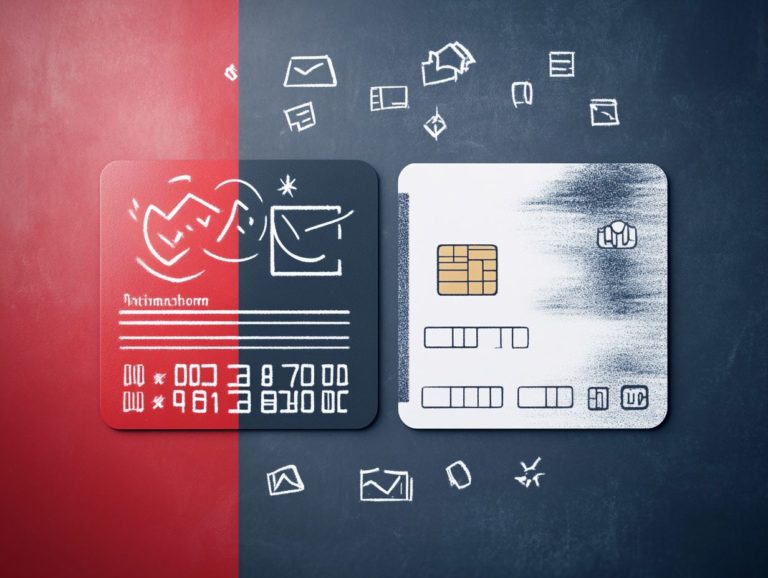Comparing Credit Card Offers: What to Look For
Navigating the credit card landscape can indeed feel like a daunting task, with an abundance of options and enticing offers competing for your attention.
Understanding the various types of credit cards is merely the first step. As you delve deeper, it s crucial to evaluate factors such as interest rates, fees, and the rewards each card has to offer.
This guide will help you easily navigate different methods and provide tailored tips based on your unique spending habits, ensuring you discover the ideal credit card that aligns seamlessly with your financial aspirations.
Contents
- Key Takeaways:
- Understanding Credit Cards
- Factors to Consider When Comparing Credit Card Offers
- How to Compare Credit Card Offers Effectively
- Tips for Choosing the Right Credit Card for You
- Frequently Asked Questions
- What should I consider when comparing credit card offers?
- What is the difference between an annual percentage rate (APR) and an annual fee?
- Are there any hidden fees I should watch out for when comparing credit card offers?
- Do all credit cards offer rewards programs?
- How can I use my credit card comparison to negotiate with credit card companies?
- What should I do if I have trouble understanding the terms and conditions of a credit card offer?
Key Takeaways:

- Compare interest rates, fees, rewards, and credit limits when choosing a credit card offer.
- Use comparison tools and assess your spending habits to effectively compare credit card offers.
- Choose a credit card that suits your needs and avoid overspending to maintain a good credit score.
Understanding Credit Cards
Understanding credit cards is essential for managing personal financial goals effectively.
These powerful financial tools offer various features and benefits, such as building your credit history, earning attractive rewards, and closely managing your spending by evaluating your credit score.
Being aware of your credit limits, interest rates, and fees gives you the power to make informed choices about your credit card usage, whether you’re a newcomer to the world of credit or a seasoned user.
You can seek advice from credit counselors, who can provide personalized insights tailored to your unique credit profile, helping you navigate credit challenges with confidence.
Types of Credit Cards Available
You ll find a variety of credit cards on the market, each crafted to meet different financial needs and preferences. Whether you’re eyeing cash back options, travel rewards, or secured credit cards for building or rebuilding credit, understanding these categories can greatly influence your financial strategy.
Cash back cards return a percentage of your purchases in cash, helping you save on everyday expenses.
On the other hand, travel rewards cards earn you points that can be redeemed for flights and hotel stays, making your adventures more budget-friendly.
If you re looking to establish or enhance your credit history, secured credit cards require a cash deposit as collateral, which not only aids in credit building but also promotes responsible spending habits.
Each card type comes with its own unique perks and rewards structures, allowing you to select the option that best aligns with your lifestyle and financial goals.
Factors to Consider When Comparing Credit Card Offers
When comparing credit card offers, it’s essential to evaluate credit card offers based on several key factors to ensure you select the card that aligns perfectly with your financial goals and spending habits.
Consider the interest rate (APR), annual fees, any applicable balance transfer terms, and promotional rates that could save you money on interest charges during the introductory period. To make a well-informed decision, it’s also helpful to learn how to compare credit card benefits that suit your needs.
Interest Rates

Interest rates, known as the Annual Percentage Rate (APR), show you how much extra money you’ll pay if you don’t pay off your balance each month. These rates are pivotal in determining the cost of using a credit card, as they dictate how much interest you ll rack up on any unpaid balance each month.
These rates can vary dramatically between different credit card offers, shaped by factors such as your credit score, payment history, and the specific policies of the issuer. For example, if you have a stellar credit rating, you ll likely benefit from lower APRs, making it easier to manage your monthly payments and reduce your overall debt.
Higher interest rates can increase your costs on outstanding balances, potentially trapping you in a cycle of debt that’s tough to break free from. Grasping these dynamics is crucial for managing your debt well, giving you the power to select the right credit options and lessen the financial sting of high interest charges.
Fees and Charges
Fees and charges associated with credit cards can have a significant impact on your overall borrowing costs. This includes annual fees, balance transfer fees, and various card-related charges that you should be well-informed about before applying.
For example, when using your card abroad, you might encounter foreign transaction fees that can quickly add up and put a strain on your budget. Exceeding your credit limit or making late payments can lead to hefty penalty fees, complicating your financial standing even further.
It’s crucial to understand these fees, as they can diminish the value of any rewards or cashback offers you may be considering. By carefully reviewing the terms and conditions, you empower yourself to make informed decisions, helping you avoid unexpected costs and manage your finances with greater efficacy.
Rewards and Benefits
Many credit cards present enticing rewards and benefits that allow you to earn points for every dollar you spend. These points can be redeemed for travel rewards, cash back, and other exclusive perks designed just for you.
Understanding the nuances of various rewards structures is crucial if you’re aiming to maximize your card s benefits. For instance, some cards might offer elevated points for dining or groceries, which is fantastic if those are your primary spending categories. On the other hand, there are cards that shine in the travel department, providing greater rewards for airline purchases or hotel bookings.
This diversity highlights the importance of evaluating your spending habits alongside your financial goals. By doing so, you can select a rewards program that fits seamlessly with your lifestyle, ensuring you extract the maximum value from your expenditures.
Credit Limit and Credit Score Impact
The credit limit assigned to your credit card can significantly influence your credit score. Maintaining a low credit utilization ratio, which is the percentage of your credit limit that you use, ideally below 30%, is essential for showcasing your creditworthiness to credit reporting bureaus.
Your credit limit is typically determined by various factors, such as your income, credit history, and overall debt levels. Lenders take these elements into account to assess the potential risk of extending credit to you.
If you’re aiming to improve your credit score, grasping the relationship between credit utilization and available credit can lead to meaningful changes. Responsible credit management isn t just about keeping your balances low; it s equally important to make timely payments.
Each month, as your credit utilization impacts your overall credit report, you should focus on using your credit wisely. This approach can open up better financial opportunities for you in the future.
How to Compare Credit Card Offers Effectively

To effectively compare credit card offers, you can leverage online comparison tools that streamline the process. These tools allow you to evaluate credit card features, interest rates, and fees side-by-side, empowering you to make a well-informed decision.
Using Comparison Tools and Resources
Using comparison tools and resources can significantly enhance your ability to find the perfect credit card that aligns with your financial goals. Consider what to look for in a rewards credit card to analyze a variety of options based on crucial criteria like APR, fees, and rewards.
These tools enable you to effortlessly compare different cards side by side, showcasing enticing features such as introductory bonuses, cashback percentages, and travel perks tailored to your unique spending patterns. Knowing how to navigate travel credit card offers can help you take advantage of these features, allowing you to make informed decisions that minimize costs while maximizing benefits.
Understanding how these comparisons work can streamline your application process, allowing you to focus on top features to look for in a credit card that best suit your individual needs and credit situation.
Ultimately, leveraging these resources empowers you to take control of your financial journey proactively, guiding you toward smarter choices and greater rewards.
Start comparing today and unlock the best deals!
Take charge of your finances now by choosing the right credit card for you!
Tips for Choosing the Right Credit Card for You
Selecting the ideal credit card demands thoughtful reflection on your spending habits and financial aspirations. Each card comes with its own distinct set of benefits, crafted to meet diverse consumer needs.
Align your choice with what you truly value in a credit card experience.
Assessing Your Spending Habits and Needs
Assessing your spending habits is essential to identify the credit card that delivers the greatest value. Some cards offer enticing cash back on everyday purchases, while others excel in travel rewards or specific categories.
By examining your monthly expenses, you can uncover routine payments like groceries, dining, or gas that may yield substantial rewards. For instance, a card that offers enhanced points for grocery shopping can transform mundane purchases into impressive benefits.
Travel-focused cards unlock increased rewards for frequent flyers and hotel bookers. This strategy boosts your rewards and promotes smarter spending.
Ultimately, you can turn ordinary expenses into extraordinary gains.
Frequently Asked Questions

What should I consider when comparing credit card offers?
When comparing credit card offers, pay attention to interest rates, fees, rewards programs, and other terms that may affect your finances. For a comprehensive look, check out this guide on comparing credit card signup offers. Consider your spending habits, credit score, and financial goals to find the best card.
What is the difference between an annual percentage rate (APR) and an annual fee?
The APR is the interest you pay on your outstanding balance, while the annual fee is a yearly cost just for having the card. The APR can greatly affect the overall cost, while the annual fee is a flat expense that must be weighed against benefits.
Watch out for hidden fees on some credit cards, such as balance transfer fees, foreign transaction fees, and late payment penalties. Always read the terms and conditions to avoid surprises.
Do all credit cards offer rewards programs?
No, not all credit cards offer rewards programs. Some are designed for individuals with lower credit scores or those looking to build credit, so they may not include rewards. If you want to earn rewards, look for cards that offer them.
How can I use my credit card comparison to negotiate with credit card companies?
By comparing low-interest credit cards, you can identify important features, benefits, and terms. Use this information to negotiate for better deals or more favorable terms with credit card companies.
What should I do if I have trouble understanding the terms and conditions of a credit card offer?
If you’re having trouble, contact the credit card company or a financial advisor for help. Understanding the terms before signing up is crucial to avoid confusion or unexpected fees.
Start comparing credit cards today to find the best one for you!






